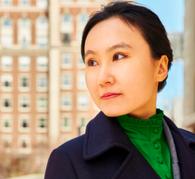












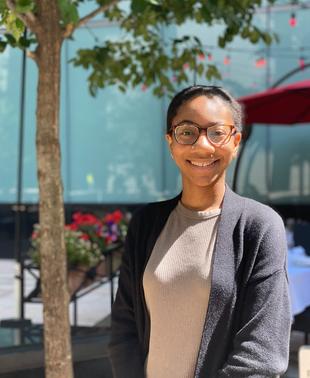


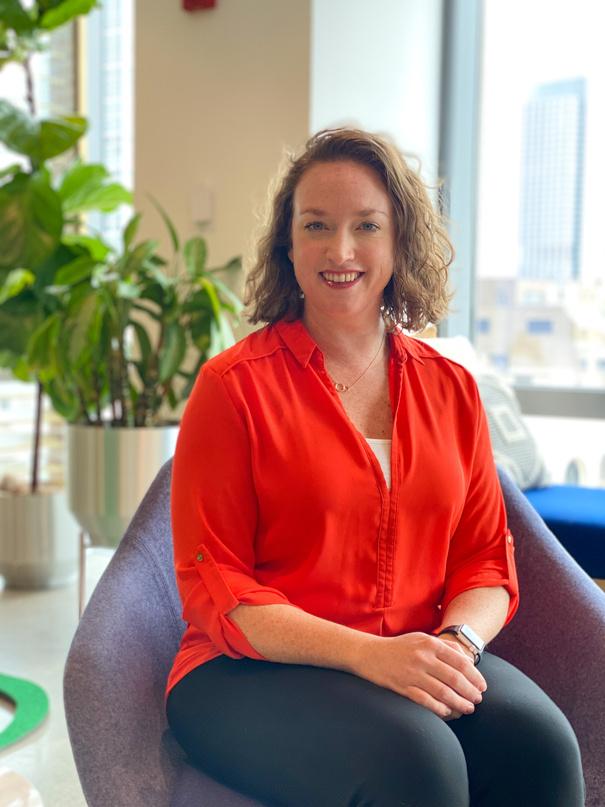


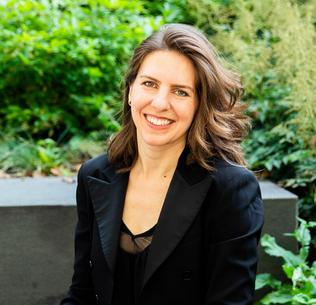

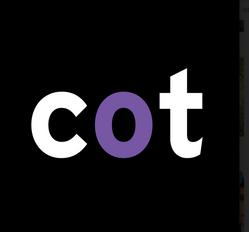


 Ashley Magnus Edlis Neeson General Director
Henry Fogel Interim General Director
Lidiya Yankovskaya Elizabeth Morse & Genius Music Director
Kelley Dorhauer Managing Director Brittany Nelson Director of Artistic Operations
Kourtney Howard Audience Services Manager
Meaghan Smallwood Director of Development
Brea Williams Grants Manager
Angela Yu Development Manager
Veronica Chamberlain Associate Director of Community Programming
Deborah Vandergrift Director of Production
Emmelly Villagran Marketing Manager
Ashley Magnus Edlis Neeson General Director
Henry Fogel Interim General Director
Lidiya Yankovskaya Elizabeth Morse & Genius Music Director
Kelley Dorhauer Managing Director Brittany Nelson Director of Artistic Operations
Kourtney Howard Audience Services Manager
Meaghan Smallwood Director of Development
Brea Williams Grants Manager
Angela Yu Development Manager
Veronica Chamberlain Associate Director of Community Programming
Deborah Vandergrift Director of Production
Emmelly Villagran Marketing Manager

It is an honor to have been asked to fill in, on an interim basis, for COT’s wonderful Stefan Edlis and Gael Neeson General Director Ashley Magnus, as she takes some time off for maternity leave. I am particularly gratified that this opportunity happens to coincide with this production of Karol
Szymanowski’s King Roger. I say that because I have loved this opera for many years, first encountering it on a 1965 Polish recording. It is, in my view, one of the most important operas of the twentieth century, and yet it is receiving just now its first ever performance in Chicago. That fact underlines the extraordinary value of Chicago Opera Theater. COT carries on the glorious tradition of opera as a living art form by presenting overlooked masterworks from the past and fine operas from our own time, in performances of the highest level, trusting an inquisitive public to support its work. I have been a member of the Board of Directors of COT for many years, and served as its President for four of them. I have done this because of my very deep belief in COT’s work. Over almost a half century, COT has nourished the art form by staging over 150 operas, including 78 Chicago premieres and 45 operas by American composers. COT’s Vanguard Initiative, led by our brilliant Elizabeth Morse and Genius Music Director Lidiya Yankovskaya, also helps to develop emerging composers by investing time and talent in new opera at various stages of the creative process. The value of COT not only to Chicago but to the opera scene in America and the world is incalculable. I hope that you will find this production of King Roger to be a gratifying experience, and that you will continue to support the work of the company.

As Chicago Opera Theater reaches its 50th anniversary, we have spent some time reflecting on the organization’s impressive legacy.
Throughout its history, COT has again and again proven to be an innovative leader in opera. Before supertitles were invented, COT
all of Chicago’s community through English language performances and relevant, timely productions. In the late 20th century, as most organizations shrank their repertoire to a few dozen works, COT presented innovative and new works that have since become American operatic classics. Throughout its history, the company has focused on identifying and—more importantly—supporting the most promising new talent on and off the stage.
As we look into the future, the organization has continued on its mission of presenting relevant, community-geared programming, supporting new voices in opera, present Chicago premieres of major canonic repertoire, and has further focused on the development of a new operatic canon. Through our fully comprehensive, multi year Vanguard Program, COT has like no other company committed to the next generation of operatic creators. The Vanguard Program ensures that some of the most promising musical storytellers today have the platform, background knowledge, behind the scenes understanding, and connections to bring their unique voices successfully to operatic stages around the world.
Over the next two seasons, we celebrate these accomplishments by alluding to our past while continuing to serve as an industry leader for the future. In 2023, 50 years
since our incorporation, you will see a return of the great Dame Jane Glover DBE, who conducted some of her early operatic projects at COT (in collaboration with then up-andcoming director Diane Paulus). With Albert Herring (which COT premiered in Chicago in 1989), we return briefly to our former home the newly renovated Athenaeum Theater. We will also bring you a world premiere of The Life and Death(s) of Alan Turing, which audiences have been calling us to stage since our recent orchestral workshop. Next season, we will continue the milestone celebration with more exciting productions, including another major Slavic premiere and some newly established American classics.
Today, the two year celebration begins with Szymanowski’s Król Roger (King Roger). As the pandemic draws to a close, we return to what all of us have been craving so desperately for the past few years—the incredible power of massive operatic forces. In featuring a Polish masterwork, we also bring focus to one of Chicago’s largest and most important cultural communities.
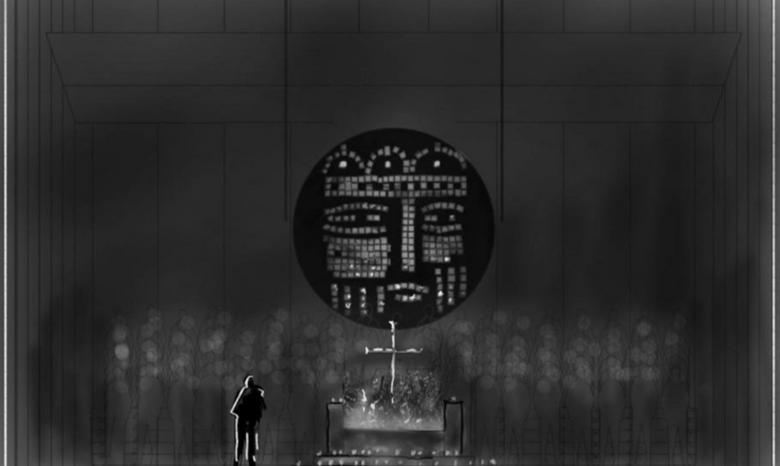
The music of Król Roger is surprisingly ahead of its time, sounding more like something written ten years ago than nearly a century. In an era when many composers were exploring serialism and writing music that was rooted in shorter, intellectually-driven structures, Król Roger focuses on long developmental arcs, finding brilliant colors and complexity in its multi-faceted orchestrations, while supporting exceptionally lyrical writing and tonal harmonic structures. Szymanowski builds on Polish musical tradition, but brings it to a new level. Unlike the plot-driven, episodic, bel canto works in earlier Polish language repertoire, Król Roger flows continuously and focuses more on subtlety of color and the wide emotional range of expression possible with such large vocal and orchestral focus.
The orchestration creates subtlety and color often through large divisions in the strings, sometimes into as many as ten or more parts within a single section. The harps and keyboard provide added effects, and the organ appears for only a few notes, but creates the deep resonance we associate with the church. A wide range of percussion instruments create the other-worldly and yet carnal presence of the Shepherd. In appearing at the start of the piece, the children’s chorus immediately elevates us to an ethereal realm and and subtly encourages listeners to look at its plot with a fresh, questioning gaze. Over the course of the opera, the orchestration showcases dramatic contrasts, starting in suspended minimalism and climaxing in a frenzied bacchanalia.
The principal role of King Roger II is exceptionally challenging. The character never leaves the stage and is required to dramatically and vocally paint many different sides of a leader dictatorial and dogmatic, generous and collaborative, vulnerable and defeated, and ultimately— reinvented. The vocal demands are vast, requiring a great singing actor with a wide range and many coloristic
capabilities. We are so fortunate to welcome from Poland Mariusz Godlewski, an expert interpreter of this role. He is joined by another leading expert on Szymanowski’s work— also from Poland in her Chicago debut, soprano Iwona Sabotka.
We are thrilled in this work to continue COT’s legacy as a community leader by partnering with several major institutions rooted in the Chicago community. The massive choral forces include the Lira Ensemble (the country’s only professional Polish language musical organization), the incredible singers of the Apollo Chorus of Chicago, and a group from United Voiced Chicago (formerly Chicago Children’s Choir an organization that has been shaping the lives of Chicago’s youth for nearly 70 years). The chorus largely represents the great masses, who are pulled from one extreme to another via the charismatic leadership of individuals. The people of Roger’s realm act as witnesses to the action, often aware of their own role in the proceedings, and ultimately serve as the driving force for change.
Król Roger's philosophical themes surrounding love, leadership, and religion are less about plot than they are about emotion. Szymanowski taps into opera’s greatest superpower: the ability to convey emotions that are impossible to put into words. The work reacts to its current events the religious fervor of the communist movement, the role of the Catholic church, the sexual liberation movement that coincided with extreme homophobia, and the replacement of monarchical rule with totalitarianism.
The creators do not dictate a worldview, do not criticize, do not pound with moral platitudes or a progressive agenda. Instead, Król Roger draws parallels to a long-forgotten time, in a place unlike most others—experiencing the torn king’s
internal conflict in a Sicily of the past. Together with Roger II, we are forced to engage with questions that are just as relevant today as they were in Szymanowski’s time—or perhaps more so. Questions that—in our increasingly more polarized world, as ever stained with oppression, violence and totalitarianism—have become critical to our collective future.
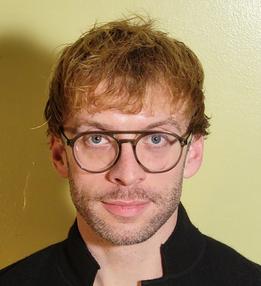
Roger II became King of Sicily in 1130, shortly after the Norman Conquests of Southern Italy. Unlike the Norman Conquerors of England, Roger embraced the ethnic diversity of the region, both Arab Muslim and Byzantine Orthodox Culture, rather than imposing some version of Roman
Catholicism, and he ushered in a then unheard of unity. This Xenophilia is crucial to our understanding of Szymanowski’s opera. Roger is not simply a man thrown into a crisis of faith because an attractive pagan has come to town. He is a man witnessing dramatic religious and cultural collisions, trying to find a way forward. His attraction to the Shepherd triggers a reactionary lashing out, but he must confront his urges. Each subsequent interaction with the Shepherd brings him closer to his epiphany. Beneath the complex and tumultuous religious history of this time and place lies something deeper, more ancient. Clarity and Logic are not opposed to Instinct and Desire; the Apollonian and Dionysian forces are neither rivals nor opposites. These things are intertwined, and they rely on each other. In the Bacchae by Euripides, (a play whose plot the opera loosely borrows), King Pentheus rejects the Shepherd outright and his rejection leads to his tragic demise. Roger, on the other hand, really wrestles with the Shepherd and tries to understand him, and perhaps even manages to find some kind of happy ending.
Lidiya is a fiercely committed advocate for Russian masterpieces, operatic rarities, and contemporary works on the leading edge of classical music. She has conducted more than 40 world
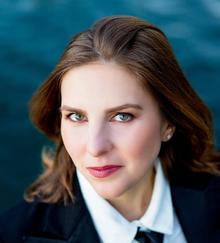
premieres, including 16 operas, and her strength as an innovative and multi faceted collaborator has brought together the worlds of puppetry, robotics, circus arts, symphonic repertoire, and opera onstage. Under her leadership, COT has established the Vanguard Initiative, a multi pronged investment in new opera that includes a two year residency for emerging opera composers. As a soughtafter speaker, Lidiya has led sessions at the League of American Orchestras and OPERA America conferences, and recently served as U.S. Representative to the World Opera Forum in Madrid.
Evans | Director joined the directing staff at The Metropolitan Opera, and has directed productions for Chicago Opera Theater, Chicago Summer Opera, The Chicago College of Performing Arts, and Opera Memphis.
Dylan was born in Milwaukee, WI, grew up in Chicago, IL, and is currently based in New York, NY. He attended the Lawrence University Conservatory of Music where he studied Music Performance and German. He Recently
 Lidiya Yankovskaya | Conductor
Dylan
Lidiya Yankovskaya | Conductor
Dylan
Mariusz Godlewski | King Roger II COT
Studied singing at the Music Academy in Wrocław. Awarded many times at national and international competitions.
From 2001, he studied with a scholarship with Leopold Spitzer in Vienna. The following year, he made his debut as Pelléas at Pelléas et Mélisande at the National Opera in Warsaw and performed in numerous operas and well known festivals in the country and abroad. In 2012, he sang the world premiere of Krzysztof Penderecki A sea of dreams at me at the Warsaw Philharmonic.
Godlewski has collaborated with many conductors, including Valery Gergieje (White Nights Festival St. Petersburg) and Krzysztof Penderecki (Beijing Music Festival) as well as Alberto Zedda, Fabio Biondi. In 2014, he received the Jan Kiepura award for the best baritone and in 2015 the nomination for the role of Eugene Oniegin..
His repertoire includes numerous roles such as Escamillo in Carmen, King Roger in King Roger (performed in Poland, Germany and Switzerland), Prosdocimo in Il turco in Italy, Sharpless in Madama Butterfly, Zurga in Les pêcheurs de perles, Redburn in Billy Budd, Enrico in Lucia di Lammermoor, Tonio in I Pagliacci, Don Giovanni in Don Giovanni, Il Conte in Le nozze di Figaro, Yeletsky in Pikovaya dama, Wolfram in Tannhauser, Tadeush in The Passenger (performed in Germany and Poland), Don Carlo di Vargas in La forza del destino (performed in Poland and Austria).

Iwona Sobotka | Queen Roxana COT Debut Iwona Sobotka achieved international acclaim as the Grand Prize winner of the Queen Elisabeth International Music Competition in Belgium. Other awards include First Prize at the Warsaw Polish

etition and First Prize at the East & West Artists International Auditions in New York, that resulted in her debut concert in Carnegie Hall.
Upcoming operatic engagements include debuts as Roxana (Krol Roger) for Chicago Opera Theater, Daughter (Shostakovich's The Nose) for Teatro Real Madrid, Contessa (Le Nozze Figaro) for Estonian National Opera, Cio Cio San (Madame Butterfly) for Poznan Opera, return to Silesian Opera as Magda (La Rondine) and to Opera Podlaska as Mimi (La Boheme).
Iwona made her operatic debut at the National Opera in Paris, where she performed the roles of the First Lady (The magic flute) and Ygraine (Ariane et Barbe Blue). Other roles with which she has enjoyed great success have included: Tatyana (Eugene Onegin), Donna Anna (Don Giovanni), Violetta (La Traviata), Pamina (The Magic Flute) and Mimi (La Boheme), Liù (Turandot). She performed many times as Pamina in the world renowned Barrie Kosky’s production of The Magic Flute with Komische Oper Berlin appearing in Germany, Australia, New Zealand, Macao and Taiwan to great critical acclaim. Other as well as for festivals such as Osterfestspiele Baden-Baden, Bayreuther Festspiele, Schleswig Holstein Music Festival, Tokyo Spring Festival. Iwona performs with many world leading orchestras and with renowned conductors.
Tyrone Chambers II | The Shepherd American tenor, Tyrone Chambers, was heralded by the Allgemeine Zeitung as “...a real asset, due to his artfully melting tenor.” He first appeared in Germany singing Sporting Life in the Gershwins’ Porgy and Bess in Dresden’s Semperoper and
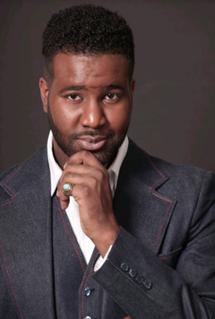
Hamburg State Opera. In 2017, Mr. Chambers made his Swiss debut, singing the role of Joe in Gerswhin’s Blue Monday, and more recently, at Opernakademie Schloss Henfenfeld, both as Belmonte in Die Entführung aus dem Serail, and the eponymous role in La Clemenza di Tito.
After creating the role of Dele Piebald in the world premiere of Quamino’s Map at Chicago Opera Theater, he was praised for his “lush tenor that [you] wanted to hear more of.” A native son of one of America’s earliest cities of opera, New Orleans, LA he is a founding tenor of OperaCréole, a unique opera company making its mark at home and abroad. Mr. Chambers has performed principal roles Diron Hachard in Minette Fontaine and Jean Torrès in La Flamenca, by William Grant Still and Lucien Lambert,d respectively, Basile Barès in Les Lions de la Reconstruction, compiled and written by Givonna Joseph, and a plethora of works that focuses on the classical contributions of 19th century New Orleans Creole composers, les gens de couleur libres, and other composers of African descent. This language enthusiast holds music degrees from the University of Oklahoma and Morehouse College. Post-graduate work includes Gastone in La traviata (Prelude to Performance), Eisenstein in Die Fledermaus (Opera in the Ozarks), and Laërtes in Mignon (Music Academy of the West). The Süddeutsche Zeitung praised him for having a “splendid voice, fit for both big stages worldwide, and important roles at home. [The voice is] fine in the heights, elegantly gliding on the tempi waves and in forte with powerful emotion.”
In his first Brazilian appearance, Mr. Chambers presented a solo recital called "Seréstas, Spirituals, and Song". Once more, this winter he will lead the acclaimed Andrew Lloyd Webber Musical Gala throughout western Europe and Scandinavia. Other major highlights include El Remendado in Carmen with New Orleans Opera Association and Russell Davenport in Dan Shore’s Freedom Ride in its Chicago Opera Theater world premiere.
Mr. Chambers currently resides in Mainz, Germany where he likes to travel, go to wine fests, and spend as much time as possible with friends near the Rhine.
Paul Chwe MinChul An | Archiereios
Critically acclaimed bass Paul Chwe MinChul An has performed over 70 roles in a career spanning two decades. His operatic and concert soloist credits include roles with NY Philharmonic,
London Symphony Orchestra, LA Philharmonic, LA Opera, San Diego Opera, Nashville Opera, Orlando Opera, PROTOTYPE Festival, and Long Beach Opera. Although Paul does not consider himself fixed to one discipline or genre, he particularly revels in the collaborative process of originating roles. Adjacent to the stage, Paul Chwe MinChul An is working to carve out space for underrepresented artists. As a consultant to performing arts organizations, as well as member of the Queens Voice Lab, he is joining other beautiful and powerful voices to decolonize, abolish, build, and raise up institutions and communities.

David Cangelosi | Edrisi David Cangelosi made his Metropolitan Opera début in 2004 as Mime in Das Rheingold under the musical direction of legendary conductor James Levine; and has returned to the MET in multiple roles over the past eighteen years. He performed his signature role of Mime with the Lyric Opera of Chicago, San Francisco Opera, Washington National Opera, Opéra de Montreal, and the Boston Symphony Orchestra. Additionally, he performed Mime in Das Rheingold and Siegfried with the Hong Kong Philharmonic, both of which were recorded on Naxos and conducted by Jaap van Zweden of the New York Philharmonic. A pandemic shortened 2020/2021 season would have found Cangelosi in his role debut of Loge in Das Rheingold at the famed Teatro Colón, Buenos Aires. Upcoming engagements include a special presentation of Siegfried with Juneau Lyric Opera, a role debut of Eisenstein in a new production of Die Fledermaus for Western Plains Opera, as well as a role debut of Edrisi for Chicago Opera Theater’s production of King Roger in late 2022. He recently completed a 2022 holiday run of The Magic Flute with the Metropolitan Opera, a multi media production of Cunning Little Vixen with the Cleveland Orchestra in Cleveland and toured Vienna and Luxembourg with the same. David recently sang two highly acclaimed U.S. Premieres: Martinû’s Juliette: Key to Dreams at Carnegie Hall and Korngold’s Das Wunder der Heliane at Bard Music Festival with the American Symphony Orchestra under the direction of Leon Botstein. He returned to Washington National Opera for Magic Flute and Boris Godunov in 2019/2020, and Western Plains Opera for Hansel and Gretel in early 2020. Mr. Cangelosi sang his role debut of Shuisky in Boris Godunov with the Dallas Opera and has returned to the company for Moby Dick and Madame Butterfly. Additionally, he has sung Monostatos and Basilio with Paris Opera (Bastille/Garnier), and Pedrillo in Die
Entführung aus dem Serail with the Ensemble Orchestral de Paris. Mr. Cangelosi recorded the sword-forging scene from Siegfried with Plácido Domingo for the EMI Classics CD “Domingo/Scenes from the Ring.”

Alissa Anderson | Deaconess COT Debut Hailed for her “deliciously over the top” and “powerful mezzo” by Opera News, Alissa Anderson wields her comic prowess, striking features, and her “powerful vocalism” to great acclaim. Ms. Anderson achieved a considerable success and was celebrated for being “impeccably prepared” and “splendid in every way” when she stepped in as Florence Pike in Santa Fe Opera’s Albert Herring under the baton of Sir Andrew Davis. This season, Ms. Anderson makes her debut at Angers-Nantes Opera as Mother Goose in The Rake’s Progress, reprises her Marcellina at Austin Opera, joins the Metropolitan Opera as Nurse (cover) for their production of Boris Gudunov, brings her Dame Quickly to Falstaff with Berkshire Opera Festival, Sings Mama in Why I Live at the Post Office with UrbanArias, and sings Erda in Das Rheingold with Opera Santa Barbara. She also joins Heartbeat Opera as alto soloist in their annual Messy Messiah concert. The recent COVID impacted seasons saw her debut with Opera Philadelphia as Princess Clarissa in The Love for Three Oranges, Mrs. Lovett in Sweeney Todd with the Royal Danish Opera, and a cancelled return to Opera Birmingham as Madame de la Haltière in Cendrillon.









The Chicago Opera Theater President’s Council was founded by former Board President Gregory J. O’Leary. President’s Council members play an integral role in the future of the company as advocates and supporters. Membership is open to donors contributing at least $1,500 annually, and members enjoy special behind the scenes access on a sponsored production, as well as exclusive events and optional board committee service. In the 22/23 season, the President’s Council sponsors Benjamin Britten’s Albert Herring. To join the President's Council, contact Director of Development Meaghan Stainback Smallwood at ms@cot.org or 312 874 7454.
*Board Member ^President’s Council ‡In-kind †Deceased List reflects gifts received between 8/12/2021 and 10/12/2022
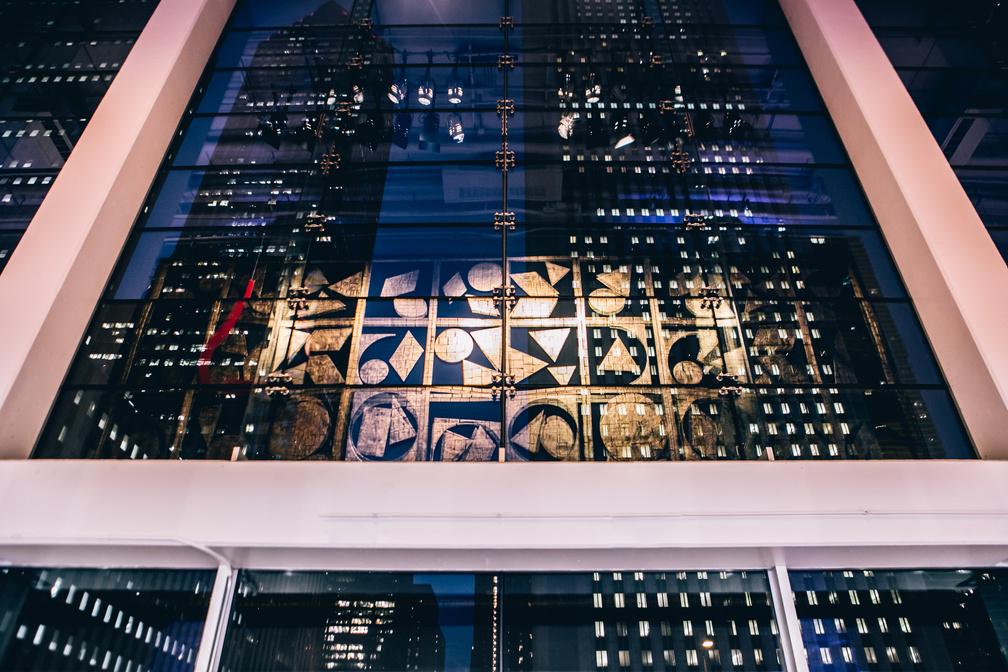
COVID Protocols: The Harris Theater strongly recommends proper wearing of masks at all times for audiences in the theater including while in line to enter, when in close proximity to others, and throughout the performance. For more information, visit harristheaterchicago.org/faqs.
In Consideration of Other Patrons and the Performers: Photography is not permitted in the Theater at any time and texting during performance is strictly prohibited. Film or digital images will be confiscated or deleted by the Harris Theater house staff; violators will be subject to a fine. Latecomers will be seated at the discretion of the house management. Smoking is prohibited within the Harris Theater. Allowance of personal items and baggage into the auditorium space is at the sole discretion of house management.
For Your Safety: Please take a moment and note the nearest exit. In the event of an emergency, follow the directions of the Harris Theater house staff. In the event of an illness or injury, inform the Harris Theater Front of House Manager.
Accessibility: Wheelchair accessible seating locations, swing arm aisle seating, and inclusive/wheelchair accessible restrooms are available on all auditorium seating levels. The Harris is also equipped with an FM Assistive Listening Device system. Headsets are available for check out with a valid ID. Please call the Box Office in advance at 312.334.7777 regarding ticketing and accessible seating questions. If inquiring on any additional accommodation requests to enhance your performance experience, please reach out to access@harristheaterchicago.org or call 312.334.2486 at least two weeks in advance.
Parking: Discounted parking validation is available for all ticket holders using the Millennium Park Garage. A validation machine is located on Lobby Level 5 (Upper Randolph).
Rental Information: If you have any questions about the Harris Theater, including rental of the facility, group tours, or volunteer opportunities, please email rentals@harristheaterchicago.org.
Harris Theater Mission: The Harris Theater is Chicago’s home for music and dance, connecting diverse audiences with artists from across the city, the nation, and the world. Opened in 2003 in Millennium Park, the Theater was the first multi use performance venue built in downtown Chicago since 1929, and fulfilled the city’s need for a shared home for mid size performing arts organizations. Today, the Harris features some of the most diverse arts and culture offerings of any venue in the city, and is a distinctive model for artistic quality, collaboration, and making the performing arts relevant and accessible to the widest possible audience. Founded on the principle of serving Chicago’s vibrant creative community, the Theater is the home venue of more than 25 not-for-profit arts and culture organizations. The Harris Theater Presents series has featured worldrenowned artists and ensembles including Laurie Anderson, Batsheva Dance, English National Ballet, Joshua Bell, Renée Fleming, Sir John Eliot Gardiner and the Monteverdi Choir, Angélique Kidjo, and Paris Opéra Ballet. The Theater’s community engagement initiatives build bridges between artists and community members, providing master classes, artist talks, and free tickets for more than 35 partner organizations throughout Chicago.To learn more about the Harris Theater, Chicago’s state of the art 1,499 seat performance venue in Millennium Park, visit harristheaterchicago.org
The Harris Theater for Music and Dance resides on the traditional homelands of the Council of the Three Fires: the Ojibwe, Odawa, and Potawatomi Nations. Many other tribes such as the Miami, Ho Chunk, Menominee, Sac, and Fox have also called this area home. The region has long been a center for Indigenous people to gather, trade, and maintain kinship ties. Today, one of the largest urban American Indian communities in the United States resides in Chicago, and members of this community continue to contribute to the life and culture of this city

The Apollo Chorus of Chicago is the area's premier volunteer chorus. Its over 120 auditioned members include men and women of all ages, races, creeds, and occupations brought together by their abiding love of music. The voices of college students blend seamlessly with the voices of retirees who have belonged to Apollo for over fifty years. The singers' dedication, artistry, and passion produce performances of unrivaled majesty.
Apollo performs the masterworks of the choral repertoire in concert halls and cathedrals all over the Chicagoland area.

Recently the Chorus has performed Mendelssohn's Elijah, Bach's Mass in b minor, Orff's Carmina Burana, and Mozart's Requiem. Apollo's annual performances of Handel's complete Messiah have become a beloved holiday tradition for Chicago families. Apollo embraces new masterpieces too and has featured contemporary composers Eric Whitacre, Eleanor Daley, and Stephen Paulus in its repertoire. Annual Spring Concerts showcase the Chorus's range spanning from spirituals to sambas, Baroque to the Blues.
In addition to its own season, Apollo has frequently been invited to perform in music festivals and concert series with top orchestras and conductors around the Midwest, including the Ravinia Festival with the Chicago Symphony Orchestra and the Peninsula Music Festival in Door County. Apollo has also been featured in Star Wars In Concert, performed with Jackie Evancho and Josh Groban, and appeared on Oprah's 2 part finale, Oprah's Surprise Spectacular.
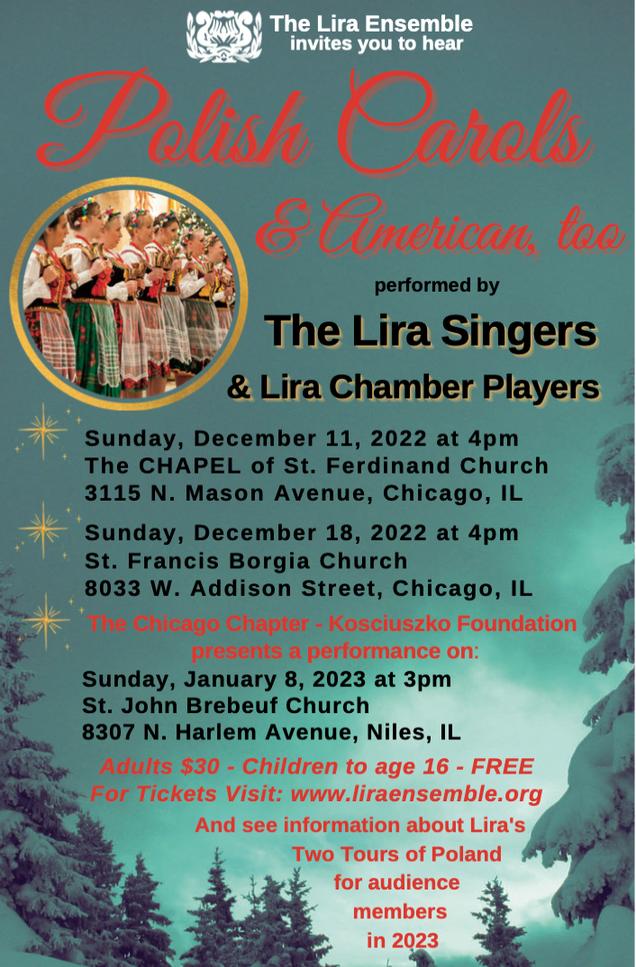
The Lira Ensemble is the nation’s only professional performing arts company specializing in Polish music, song and dance. Its mission is to bring the best of Polish culture into American life.
Founded as the Lira Singers in 1965, the ensemble now makes about 50 appearances a year in the Chicago area, across the Midwest, occasionally around the nation, and has made six concert tours of Poland. Lira has produced nine major recordings that are sold nationwide.
Lira presents the full spectrum of Polish music and dance, both classical and folk, with informative and witty English language narrations that explain the traditions and history behind the works performed. Lira has long been trusted by Polish Americans as an expert culture bearer.
Lira is the arts outreach group of Chicagoland’s Polish American community and often represents Polish Americans and Polish and Polish American culture at city, state and national events. Lira has won high praise, as well as awards, for its series of concerts performed jointly with Mexican Americans and African Americans and its outreach concerts for the American Jewish community, as well as outreach to other ethnic groups.
The company consists of a symphony orchestra, chamber ensembles, singers and dancers who perform serious, folk and popular Polish dance and music in the original language and in English translation. When appropriate, Lira artists perform in authentic folk garb of various regions of Poland as well as historically correct costumes from several periods of Polish history.
Lira is based in Chicago as artist in resident at Loyola University Chicago, which makes a significant, on going contribution to the promotion of Polish culture in the United States by donating free office, rehearsal and storage space to the Lira company.
Lucyna Migala, co-founder of Lira, serves as artistic director/general manager and narrates Lira performances, Mina Zikri is conductor of the Lira Ensemble. Iwona Puc is choreographer and director of the Lira Dancers.


Founded in 1956 as the Children's Chorus of the First Unitarian Church of Chicago in direct response to the Civil Rights Movement, Uniting Voices Chicago (formerly Chicago Children's Choir) is rooted in the belief that music is a vehicle for fostering empathy and respect between young people of all races, ethnicities, socioeconomic backgrounds, religions, gender identities, and sexual orientations.
Since its founding 65 years ago, our organization has grown from a single choir into a vast network of school and afterschool programs that serve thousands of students every year. We offers a performance-based learning experience built around innovative creative partnerships and compelling artistic endeavors—from regular appearances at Lyric Opera and Ravinia Festival to one-of-a-kind features on major recording projects like Chance the Rapper’s Coloring Book (2016) and The Big Day (2019).
For more than half a century, we have developed programs that embrace the racial and economic diversity of Chicago, making a high caliber musical education available to any singer who wants it. Accessibility forms the foundation of our signature world class instruction. Eighty percent of our youth live in low to moderate income households, and every year these 4,000+ students participate completely free of charge. Whether they’re just getting started or are already seasoned performers, youth from every corner of the city discover how to make their voice heard through our empowering programs.
As well as the main dining room, Avli on The Park in Lakeshore East also offers delightful private event spaces for hosting an intimate Chef's Table experience for 10 to receptions for 200. To inquire about private events at Avli, email events@avli.us
Paying homage to Greek traditions, Avli restaurants evoke philoxenia, a welcoming of strangers and an eagerness to show hospitality; present meraki, putting the best of one’s self into work; and offer the experience of kefi, living life joyfully. Each Avli features creative and inspired dishes, a lively beverage program including a curated Greek wine list, craft cocktails, and an ambiance and warm service that reflects life in the Mediterranean.
Avli currently has five Chicagoland locations: Avli on The Park in Lakeshore East, Avli River North, Avli Taverna in Lincoln Park, Avli Estiatorio in Winnetka, and Avli in the popular Fulton Market food hall, Time Out Market Chicago.
@avli | www.avli.us

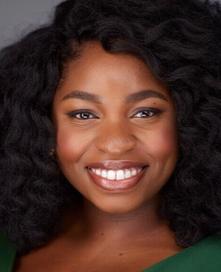


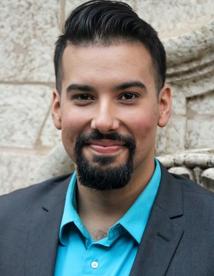

opportunity for developing pianists and singers. It allows developing artists with exceptional career promise and mastery of basic skills to focus on all areas of their artistic growth. The program affords them professional experience, particularly in the development and performance of innovative new work, while also supporting them with voice lessons, vocal coaching, and dramatic training from the illustrious music and performance faculty at CCPA.
Participants receive a full-tuition scholarship, as well as a monthly stipend during the performance season, which runs September – April.
Pauline Tan Veena Akama-Makia Karlos PiñeroMercado Corinne Costell Jennifer Allor COT'S 2022/2023